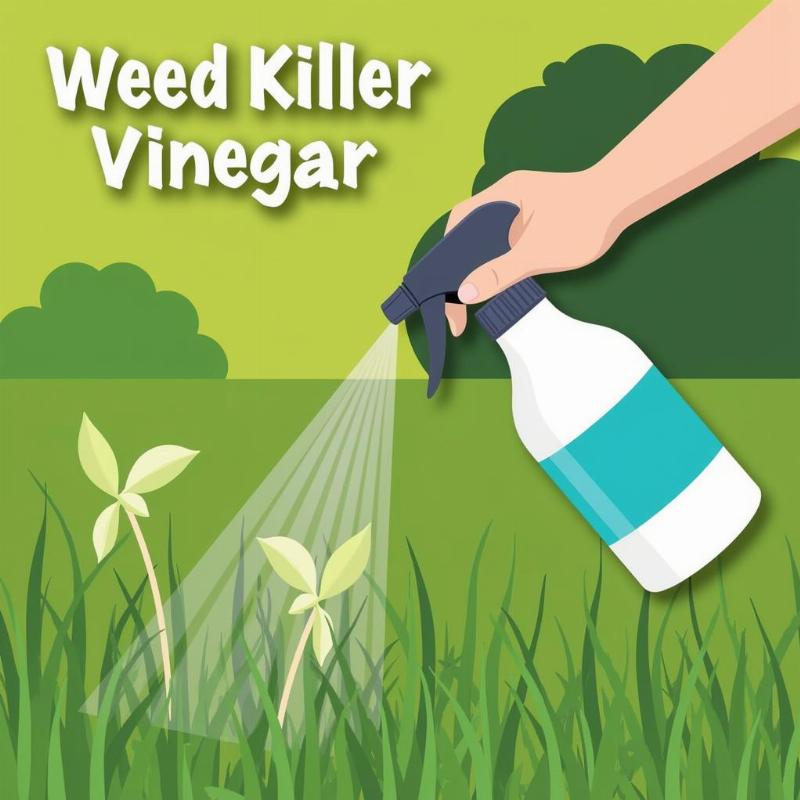Keeping your lawn lush and weed-free is a common goal for homeowners. However, many commercial weed killers contain chemicals that can be harmful to our furry friends. This raises an important question: how can we control unwanted plants while ensuring our dogs’ safety? This article explores the world of homemade dog-safe weed killers, offering effective and eco-friendly solutions for a happy, healthy lawn and a happy, healthy dog.
Understanding the Risks of Conventional Weed Killers
Conventional weed killers often contain harmful chemicals like glyphosate, 2,4-D, and other herbicides that can pose serious health risks to dogs. These chemicals can be absorbed through the skin, paws, or even ingested if a dog nibbles on treated grass. Symptoms of herbicide poisoning in dogs can range from mild skin irritation to more severe issues like vomiting, diarrhea, seizures, and even organ damage.
Safe and Effective Homemade Weed Killer Recipes
Fortunately, there are several effective homemade weed killer options that are safe for dogs, children, and the environment. These natural solutions utilize common household ingredients and are easy to prepare.
Vinegar-Based Weed Killer
White vinegar is a powerful natural weed killer thanks to its acetic acid content. Simply fill a spray bottle with undiluted white vinegar and spray directly onto weeds on a sunny day. The sun amplifies the vinegar’s effectiveness. Avoid spraying desirable plants.
Boiling Water Method
This simple yet effective method involves pouring boiling water directly onto the weeds. The intense heat damages the plant cells, effectively killing them. This is best for weeds growing in cracks in sidewalks or driveways, where you don’t need to worry about harming surrounding plants.
Salt and Soap Solution
Combine one cup of salt with one gallon of water and a tablespoon of dish soap. The salt dehydrates the weeds, while the soap helps the solution stick to the leaves. Apply this mixture directly to weeds, being cautious to avoid desirable plants.
 Spraying Homemade Weed Killer on Weeds
Spraying Homemade Weed Killer on Weeds
Preventing Weed Growth Naturally
Beyond eliminating existing weeds, you can also take proactive steps to prevent their growth in the first place.
Mulching
Applying a layer of mulch around your plants helps suppress weed growth by blocking sunlight and preventing weed seeds from germinating. Choose dog-safe mulch options like shredded bark or wood chips. Avoid cocoa mulch, which is toxic to dogs.
Proper Lawn Care
A healthy, thick lawn is naturally more resistant to weeds. Regular mowing, proper fertilization, and adequate watering can help your lawn thrive and crowd out unwanted weeds.
Hand-Pulling
For smaller areas or individual weeds, hand-pulling can be an effective and environmentally friendly solution. Make sure to remove the entire root system to prevent regrowth.
Ensuring Your Dog’s Safety While Weeding
Even when using homemade solutions, it’s important to take precautions to protect your dog. Keep your dog indoors while applying any weed killer and wait until the solution has dried completely before allowing them back outside.
Conclusion
Maintaining a beautiful lawn without compromising your dog’s health is achievable with homemade, dog-safe weed killers. By embracing natural solutions and practicing preventative measures, you can create a safe and enjoyable outdoor environment for both you and your furry companion. Remember to always supervise your dog in the yard and consult with your veterinarian if you have any concerns about their health.
FAQ
- Is vinegar safe for my dog’s paws? While vinegar is generally safe, it’s best to avoid direct contact with your dog’s paws. Rinse the area with water if contact occurs.
- How often can I apply homemade weed killer? You can reapply as needed, typically every few days or as weeds reappear.
- What if my dog eats treated grass? Contact your veterinarian immediately if you suspect your dog has ingested any weed killer, even homemade solutions.
- Are there any plants that naturally repel weeds? Yes, certain plants like marigolds and chrysanthemums have natural weed-repelling properties.
- What’s the best way to dispose of leftover homemade weed killer? You can typically pour leftover solutions down the drain.
- Can I use baking soda as a weed killer? Baking soda can be effective for spot-treating weeds in cracks and crevices.
- What are some other dog-safe mulch options? Pine straw, cedar chips, and shredded leaves are also safe mulch choices for dogs.
Related Articles
Beautdogs.us is your premier destination for dog lifestyle information in the US. We offer expert advice on dog breeds, care, and products, empowering both new and experienced dog owners to provide the best possible care for their beloved companions. Our team combines veterinary knowledge with engaging content to ensure you have access to the most reliable and comprehensive information. For expert guidance and tailored advice, contact us at [email protected] or call us at +1 501-555-7529. Beautdogs.us is committed to helping you create a happy and healthy life for your furry friend.